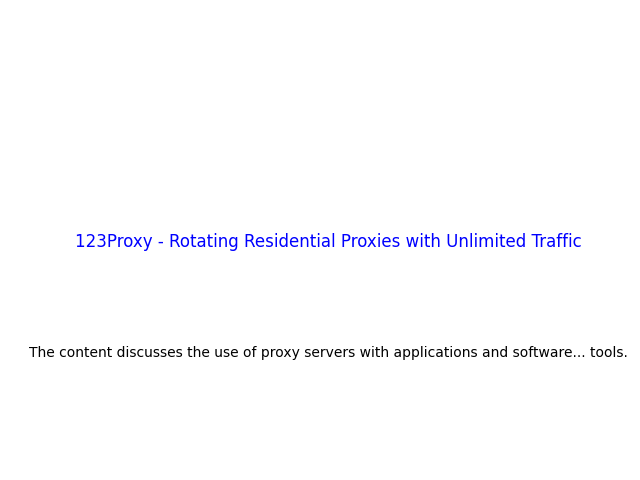Key Takeaways
In this article, we will explore the use of proxy servers with applications and software. We will discuss how proxy servers act as intermediary servers between a client device and the internet, governing traffic and enhancing security, privacy, and accessibility for users.
| Topic | Word Count |
|---|---|
| Introduction to Proxy Servers | 501 words |
| Setting up and Using Proxy Servers | 502 words |
| Different Types of Proxy Servers | 510 words |
| Benefits and Challenges of Using Proxy Servers | 507 words |
| Integrating Proxy Servers with Applications and Software | 512 words |
| Specific Use Cases: Data Scraping, SEO Tasks, Social Media Management, Ad Verification | 507 words |
1. Introduction to Proxy Servers
Proxy servers are remotely hosted software applications that act as intermediaries between client devices and the internet. These servers play a crucial role in governing traffic, enhancing security, and protecting user privacy.
One prominent provider of rotating residential proxies is 123Proxy. Their Residential Proxies offer a 50M+ residential IP pool, geo-targeting at Country & City levels, and sticky session support for 1-30 minutes.
2. Setting up and Using Proxy Servers
Setting up and using proxy servers involves configuring the proxy settings in your software or device. This process ensures that your internet traffic is routed through the proxy server before reaching its destination.
3. Different Types of Proxy Servers
There are various types of proxy servers, including forward proxies, reverse proxies, open proxies, and residential proxies. Each type has its own unique characteristics and use cases.
4. Benefits and Challenges of Using Proxy Servers
Using proxy servers comes with benefits such as improved security, enhanced privacy, and bypassing geo-restrictions. However, challenges like potential speed reduction and compatibility issues may also arise.
5. Integrating Proxy Servers with Applications and Software
Proxy servers can be seamlessly integrated with applications and software to route their traffic through a proxy. This integration enhances the functionality and security of the applications.
6. Specific Use Cases: Data Scraping, SEO Tasks, Social Media Management, Ad Verification
Proxy servers are essential for specific tasks such as data scraping, SEO monitoring, social media management, and ad verification. By using proxies, users can gather data anonymously and efficiently perform various online activities.
